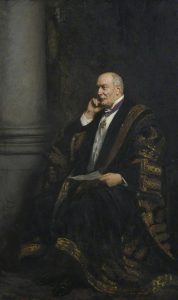John William Strutt, 3rd Baron Rayleigh, an English physicist who discovered of Argon, Rayleigh waves, Rayleigh scattering, Rayleigh criterion, Duplex theory, Sound theory, Rayleigh flow, Rayleigh-Plesset equation, Rayleigh–Schrödinger perturbation theory, Rayleigh–Taylor instability, and Rayleigh–Jeans law.
Biographical Overview
Born in England, 1842-1919
Served as president of the Royal Society from 1905 to 1908 and as chancellor of the University of Cambridge from 1908 to 1919.
Awards
Nobel Prize, 1904
Smith’s Prize, 1865
Copley Medal, 1882
De Morgan Medal, 1890
Royal Medal, 1894
Matteucci Medal, 1899
Albert Medal, 1905
Elliott Cresson Medal, 1913
Rumford Medal, 1914
Worldview
Using a biblical worldview perspective, Rayleigh successfully applied the scientific method to investigate the laws of nature, His worldview is notable from what he said –
“I have never thought the materialist view possible, and I look to a power beyond what we see.”
Lord Rayleigh


